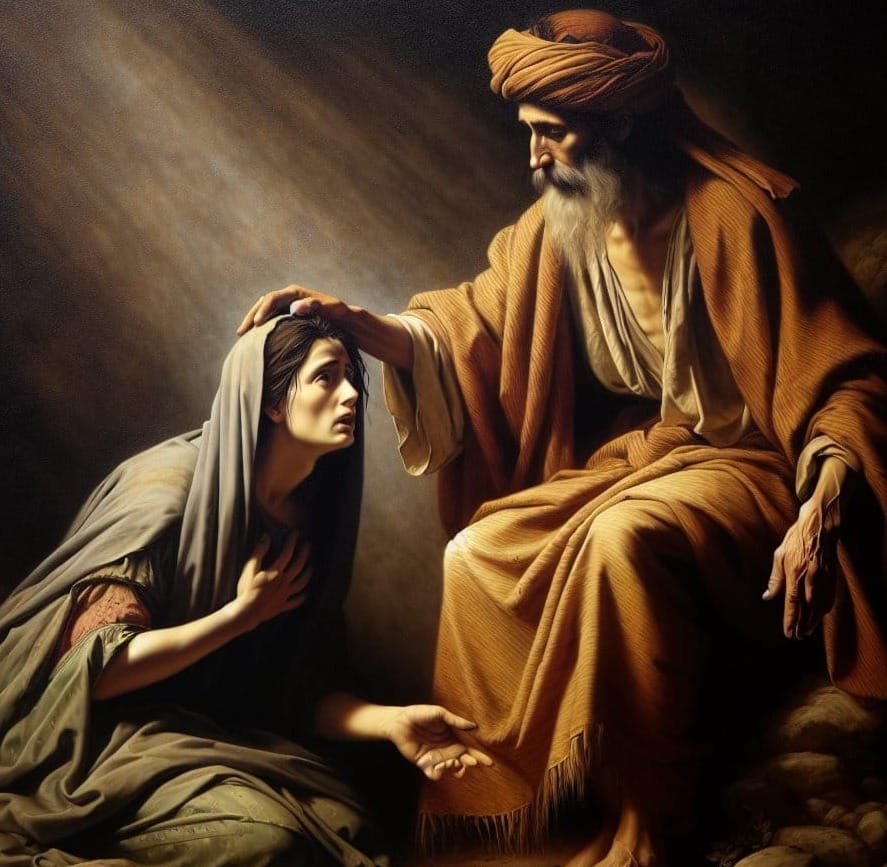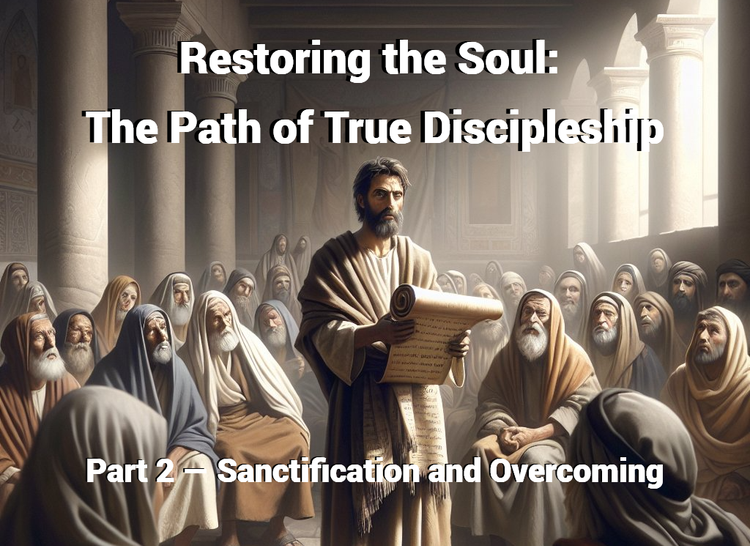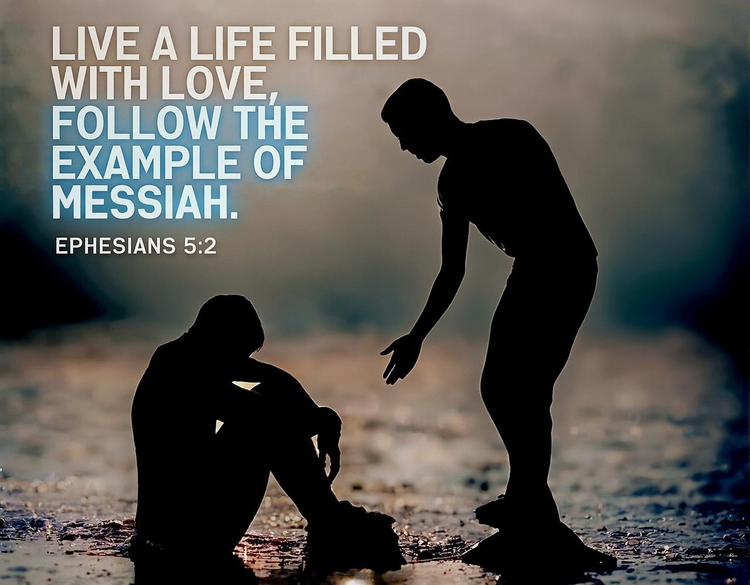Ahavah: The Fulfillment of TORAH and the Mark of a True Disciple

Fruit of the Ruach HaKodesh Series
Ahavah as the First Fruit and the Primary Identity of the Talmid
The greatest evidence of the Ruach HaKodesh in the life of a talmid is love (ahavah). Rav Sha’ul writes, “the fruit of the Ruach is love…” (Galatians 5:22, CJB). All other fruit flow from this one root, because love is the essence of Y’hovah’s nature. Yoḥanan tells us plainly, “Elohim is love” (1 Yoḥanan 4:8).
Ahavah is the foundation of discipleship because it is the foundation of Y’hovah Himself. When a talmid walks in love, they reveal the heart and character of Y’hoshua HaMashiach, who declared, “By this all people will know that you are My talmidim—if you have love for one another.” (Yoḥanan 13:35).
Love, in Scripture, is not an emotion. It is the expression of covenant obedience, faithfulness, and surrender. It is the life of Y’hovah expressed through the talmid who walks in His ways.
Born of Y’hovah — Called to Reflect His Character
The Torah begins by revealing that humanity was created “in the image and likeness” of Elohim (Berĕshith 1:26). This is our identity and calling. When we become new creations through Y’hoshua HaMashiach, we are spiritually “born of Elohim” (Yoḥanan 1:12–13). Rav Sha’ul explains that Y’hovah “predestined us to be conformed to the image of His Son” (Romans 8:29).
To resemble Y’hoshua is to walk in love, for everything He did was rooted in love for the Father and love for people. He taught:
“If you love Me, you will keep My commands.” (Yoḥanan 14:15)
Love is obedience.
Obedience is love expressed.
This is why Rav Sha’ul could say, “Love is the fulfillment of the Torah” (Romans 13:10). Torah was given out of love and is kept through love. When we walk in obedience, the character of HaMashiach is formed within us.
HEBREW WORD STUDY — אַהֲבָה (Ahavah): The Heart of Torah and the Life of the Talmid
To understand the fruit of love, we must understand the Hebrew word behind it: אַהֲבָה — Ahavah. This word does not describe emotion alone; it speaks of covenant loyalty, faithful action, righteous devotion, and relational commitment.
Ahavah as Covenant Devotion
The Torah commands: “You shall love YHVH your Elohim…” — Devarim 6:5
This is not a feeling but an act of covenant allegiance — choosing Y’hovah as King, obeying His Word, and cleaving to Him.
“You shall love your neighbor as yourself.”
— Vayikra 19:18
Ahavah toward others means doing what is right for them, restoring relationships, and acting with compassion and holiness.
Ahavah Flows From Y’hovah Himself
“We love because He first loved us.” (1 Yoḥanan 4:19)
Ahavah begins with Y’hovah’s love for Yisrael:
“YHVH set His affection on your fathers and loved them…” (Devarim 10:15)
His love is active, enduring, and covenantal.
Ahavah Is Expressed Through Chesed, Rachamim, and Emet
The Hebrew Scriptures consistently bind love to three attributes:
Chesed (Covenant Loyalty)
Steadfast love that never quits.
“His chesed endures forever.” — Psalm 136
Rachamim (Compassion / Tender Mercy)
Love that feels deeply.
“As a father has rachamim on his children…” — Psalm 103:13
Emet (Truth / Faithfulness / Reliability)
Love grounded in truth.
“Abounding in chesed and emet.” — Exodus 34:6
Together, these three words define Biblical love.
A talmid who walks in ahavah + chesed + rachamim + emet walks in the very nature of Y’hovah.
Ahavah in the Talmid’s Life
When Rav Sha’ul writes that “the fruit of the Ruach is love”, he uses agapē, the Greek equivalent of ahavah. It describes:
- loving Y’hovah with all our being (Deut. 6:5)
- obeying His commands (John 14:15)
- loving our neighbor (Lev. 19:18)
- forgiving and restoring (Matthew 18:15)
- walking in mercy and truth (Exodus 34:6)
- laying down one’s life (John 15:13)
This is the love that marks the true disciple.
Love That Casts Out Fear — Growing in Intimacy with the Father
Yoḥanan teaches:
“There is no fear in love. Perfect love drives out fear.” (1 Yoḥanan 4:18)
Fear focuses on self — weakness, insecurity, failure.
Love focuses on Y’hovah — His strength, faithfulness, and care.
Y’hoshua tells us that we are precious to Y’hovah:
“You are worth more than many sparrows.” (Mattityahu 10:29–31)
As love increases, fear diminishes. As intimacy deepens, anxiety is displaced.
As trust grows, darkness recedes.
Rav Sha’ul writes:
“In all these things we are more than conquerors through Him who loved us.” (Romans 8:37)
We conquer not through strength, but through love.
Love as Transformation — Becoming Imitators of Y’hovah
Rav Sha’ul instructs:
“Become imitators of Elohim, as dearly loved children; and live a life of love, as Messiah loved us.” (Ephesians 5:1–2)
This is transformation and discipleship.
Y’hoshua Himself lived in perfect union with the Father, saying,
“The Son can do nothing on His own; He does only what He sees the Father doing.” (Yoḥanan 5:19)
Love develops spiritual sight — the ability to discern Y’hovah’s heart in every moment.
Even in grief, Y’hoshua responded in love. After hearing of Yoḥanan the Immerser’s death, He withdrew to pray (Matt. 14:13)—to realign His heart with the Father. When the crowds followed, He “was moved with compassion and healed their sick” (Matt. 14:14).
Love leads us back to the Father’s perspective and leads us into action.
Praying in the Ruach keeps us in that love:
“Building yourselves up… keeping yourselves in the love of Elohim.” (Jude 20–21)
Love is not earned by others.
Love is the talmid’s obedience to Y’hovah.
Love: The Fulfillment of Torah
Rav Sha’ul declares:
“Love is the fulfillment of the Torah.” (Romans 13:10)
Why?
Because Torah is the revelation of Y’hovah’s character — and love is the essence of His character.
Y’hoshua brings Torah and love together:
“On these two mitzvot—love YHVH… and love your neighbor—hang all the Torah and the Prophets.” (Mattityahu 22:40)
Everything Y’hovah commands flows from love. Everything a talmid does must flow from love. This is the mark of the true disciple.
Love as the True Mark of the Talmid
Love is the fulfillment of Torah, the heartbeat of discipleship, and the unmistakable evidence that the Ruach is at work within us. When we walk in ahavah, chesed, rachamim, and emet, we reflect the character of Y’hovah and the life of Y’hoshua HaMashiach.
Love restores the soul.
Love conquers fear.
Love strengthens obedience.
Love transforms the heart.
Love marks the talmid of Y’hoshua.
This is the first fruit of the Ruach, the foundation of all the others. This is the 'WAY' of Y’hovah.
By Rabbi Francisco Arbas
📧 franciscoarbas.yisrael@gmail.com
Following His ‘WAY’ — Netzari Mashiach Judaism



Comments ()